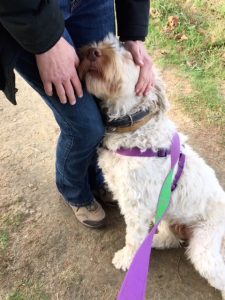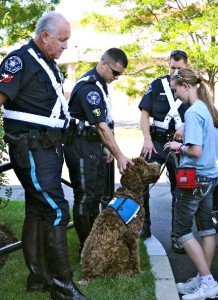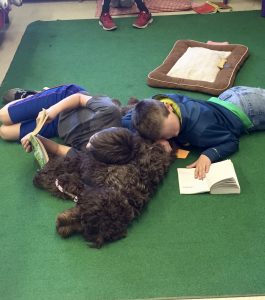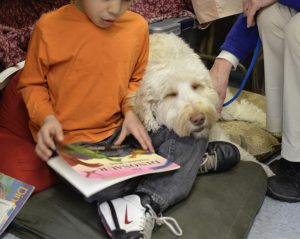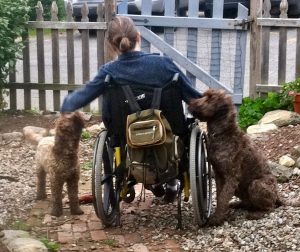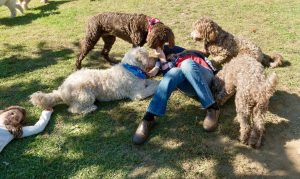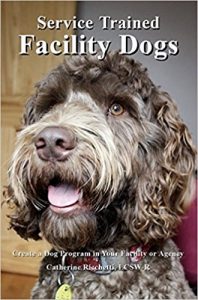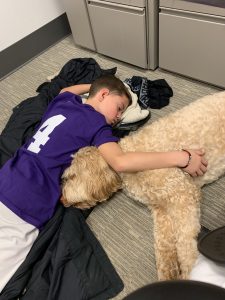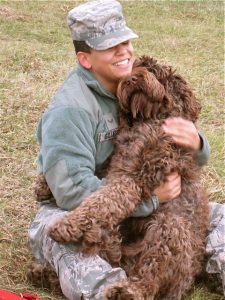The Berkshire Hills Cobberdogs have been selectively bred for therapy work.
The most important characteristic of a therapy dog is its temperament. A good therapy dog is friendly, patient and enjoys engaging with people. That temperament needs to be shaped by positive methods and a good understanding of your dog’s nature.
THERAPY DOGS…definitions
Therapy Visitation Dogs are household pets whose owners take time to visit hospitals, nursing homes, schools and rehabilitation facilities. They are certified dog/handler teams that are trained to provide affection and comfort.
An Animal Assisted Therapy Dog, is handled by a trained professional to be a therapeutic support for individuals dealing with depression, schizophrenia, addiction, autism, behavioral issues, dementia, as well as medical or physical conditions.
Thom Herman with his animal assisted therapy dog, Berkshire Hills Carson
“Facility Dogs are trained in obedience and specialty cues, and used in the work setting under the direction of the professional partner who has been trained in specific techniques which enable the dog to serve as a tool and a motivator.” https://www.pawsteams.org/therapy-dogs/facility-dogs/
Facility dogs are trained to offer services for facilities such as schools, police departments, medical offices, etc. These dogs work regularly in the facility.
An excellent book to read if you are considering starting a dog program in your school:
Service Trained Facility Dogs. By Catherine Ricchetti
SERVICE TRAINED FACILITY DOGS: Creating a Dog Program in your Facility or Agency answers the question that other professionals are asking; “How do you get a dog program up and running in a facility or agency?” The book is an easy-to-follow step-by-step guide to beginning a facility-dog program. The book reviews the process from start to finish; covering brain research, program funding, choosing a dog, socializing, training, mistakes to avoid, and working with your dog and your colleagues to support clients young and old in different facilities.
Charlotte’s Litter
Charlotte’s Litter, a program supported by Newtown Kindness, was founded in honor of Charlotte Helen Bacon, a young avid dog lover, who tragically lost her life on December 14, 2012 in Sandy Hook, CT. Charlotte’s Litter seeks to connect resources and experienced people to help provide input and guidance for schools in their process of fact finding and adoption of an appropriate therapy dog program.
Their website has great resources for schools. Charlotte’s Litter
Emotional Support Dogs provide comfort and support in forms of affection and companionship for an individual suffering from various mental and emotional conditions. An emotional support dog is not required to perform any specific tasks for a disability like service dogs are. They are meant solely for emotional stability and unconditional love. They can assist with conditions such as anxiety, depression, bipolar disorder/mood disorder, panic attacks, fear/phobias, and other psychological and emotional conditions.
A Berkshire Hills dog will do well as an emotional support dog as long as there is a calm adult in the house that can be a “neutral person” to help desensitize the dog to the ups and downs of emotions and behavior of the person needing an emotional support dog. Our dogs pick up on our emotions so they could become anxious if their only adult struggles with anxiety, PTSD or other emotional challenges. Please contact us for more information to see if a Berkshire Hills dog is right for you.
Service Dogs A service dog is individually trained to do work or perform tasks for the benefit of an individual with a disability, including a physical, sensory, psychiatric, intellectual, or other mental disability, under Title II and Title III of the ADA. Tasks performed can include, among other things, pulling a wheelchair, retrieving dropped items, alerting a person to a sound, reminding a person to take medication, or pressing an elevator button.
Training service dogs can take several years, are very costly and the wait list can be long. There are some training organizations that help you train your own service dog.
Resources for service dogs:
Here is an article that has resources for affording a service dog: https://www.bankrate.com/personal-finance/how-to-afford-a-service-dog/


